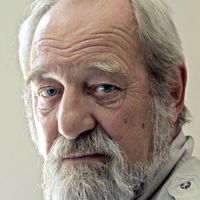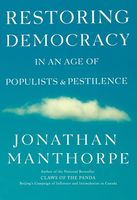Combat Populism with an Excerpt from Jonathan Manthorpe's Restoring Democracy in an Age of Populists and Pestilence
It's been hard to miss the rising tide of populism that has crept into democratic discourse in North American and Europe in the past decade. What to do about it and what it means are trickier challenges, and while it is easy to observe the populist slide and despair, veteran journalist and political author Jonathan Manthorpe is helping readers to find some light in the darkness in his newest book.
Restoring Democracy in an Age of Populists and Pestilence (Cormorant Books) comes just a year and a half after Manthorpe's Writers' Trust Shaughnessy Cohen Prize nominated bestseller The Claws of the Tiger.
Focused on how we might go about saving our democracy, it's a hopeful rallying call in a difficult era, with Manthorpe arguing for the resiliency of democracy and offering advice about what both governments and individuals can do to protect society from extremism and oversimplification. He even tackles the COVID-19 pandemic and how it is likely to factor into the future of our democratic systems.
We're pleased to offer an excerpt from Restoring Democracy in an Age of Populists and
Excerpt from Restoring Democracy in an Age of Populists and Pestilence by Jonathan Manthorpe:
Introduction
This is going to be a fast gallop over heavy ground. In a few thousand words and a handful of chapters, I am going to set out what I think has gone wrong with liberal democracy in the last forty years. But this is not a book about failure. It is a book about hope. The threats to democracy can be beaten off and reversed.
Because they seek to respond to the views and expectations of their citizens, liberal democratic societies are inherently adaptable and resilient. But some of them have drifted, and some are now drifting; they risk tipping into the ditch of despotism or worse. They can and must be refashioned to function and thrive in the new age that has been thrust upon us. There will not be one uniform solution. Each nation is going to have to find salvation built upon the foundation of its individual history, culture, and aspirations, as well as how it has come out of the pandemic socially and economically. COVID-19 has changed the rules of many games, but it is also a reminder of what is of value in human communities, what is essential to making them flourish, and what is mere frippery. The timing of the pandemic and the insights it has provided ought to enliven the quest to restore democracy. It is a challenge that must be embraced with excitement and exhilaration. It is an adventure that should be approached with an entirely open mind for the almost infinite possibilities available for the construction and protection of modern democratic frameworks. This exploration will require courage, perseverance, and a clear understanding of what has gone wrong in the last four decades.
The factors I consider important in the erosion of democracies are my own selections, based on my fifty-five years in journalism. My experience in North America, Europe, Africa, and Asia has given me the opportunity to see up close how democracies are created, what sustains them, why some fail to survive, and the tricks despots use to destroy them. I make no claim that the events I’ve written about are exhaustive or the best ones to illustrate the situation. They do, however, illuminate my concerns. I have chosen to focus on the challenges to democracy in the countries of Europe and North America, a region I refer to as the North Atlantic countries, the repository of North Atlantic culture. My purpose is twofold. Taking into account the widely differing cultural contexts in other democracies threatened by populism, such as Brazil, India, or the Philippines, would widen the lens too much, and the narrative would lose focus. Examples of the kinds of threats to democracy evident worldwide are to be found throughout the North Atlantic. In my career as a journalist and, more pertinently, as a foreign correspondent and international affairs columnist since 1979 in Europe, Africa, Asia, and North America, I have been in the front row as many of the events described in this book unfolded. My judgments and selections may be open to criticism, but they were come by honestly.
One of humanity’s less attractive traits is a passion for gloom and doom. All too often, people see the cloud on the horizon and not the otherwise flawless blue sky above. The tendency to focus only on the negative is a real danger in these times of political turmoil and uncertainty. Paranoia can become self-fulfilling. We face an unceasing barrage from talking heads and political strategists warning us that democracy and its accompanying virtues of liberalism, tolerance, and communal cohesion are under immediate threat from the forces of authoritarianism, hatred, and tribalism. There are indeed threats to modern democratic liberalism from within and without, just as there have always been since it emerged out of Western Europe’s Age of Enlightenment three and a half centuries ago. There is nothing inevitable about the victory of populists, depots, and demagogues, no matter how fertile the ground may be for them. Far from it.
The concept of liberal democracy has always contained contradictions and fundamental differences of opinion about its philosophy, even among its most avid supporters. During most of the twentieth century, those contradictions were sidelined by the greater battles between democratic liberalism and first fascism and then communism. But with the end of the Cold War and the collapse of the Soviet Union, the fallibility and conflicts within liberal democracy have not only bubbled to the surface, they are threatening to erode the whole structure of what I think of as North Atlantic culture. The threats include the emergence of intellectually detached and socially isolated ruling classes that span politics, government, business, academia, and the media. Accompanying that isolation are gross disparities of wealth. This has produced entire communities beached by technological advances and changing patterns of commerce while, according to Oxfam, 1 percent of the world’s population — 75 million people — holds half the world’s wealth, making them richer than the other 7.4 billion people.
Arising from the insecurity fostered by economic stagnation are fundamental changes in the concept of the nation-state. For many people, especially in the North Atlantic countries, their culturally familiar and homogenous communities are changing or disappearing as foreigners migrate to their countries in search of work or freedom from fear and war. These migrants bring cultural and social changes with them. When a community’s identity and self-confidence is already under stress from economic uncertainty, the arrival of foreign influences is not always welcome. For some liberal democracies, especially nations built by immigration, such as Canada, cultural, social, and racial diversity remains a virtue and a goal. But even in immigrant societies like Canada and Australia, and among some European countries with welcoming refugee policies, there are resentful minorities who feel their culture is being changed or diluted. These people must not be ignored.
Your CanLit News
Subscribe to Open Book’s newsletter to get local book events, literary content, writing tips, and more in your inbox
The volume and intensity of the debate over these conflicts and contradictions is ratcheted up by confusion over what constitutes fantasy, truth, and lies. The cacophony created by the torrent of instantaneous digital communication and chaotic social media is unlike anything with which humans have had to contend before.
Singly and in combination, these threats provide fodder for those who would undermine and overthrow democracy. Some of the adversaries come from within. These are the populist flim-flam artists and those darker beings who believe in the power of destruction. They see the buffeting of democracy as an opportunity to indulge their own personality disorders and extremist notions.
There are fundamental differences between the populist uprisings in Eastern Europe, the United Kingdom, and the United States. Poland and Hungary are countries transitioning to democracy from long histories of authoritarian rule; they are moving from the grip of one empire, the Soviet Union, into that of another, the European Union. These difficult and scary progressions deserve a lot more careful attention than they are currently receiving. It was a populist movement, perhaps even a revolution, that led to the UK’s departure from the EU at the end of January 2020. But what stands out is that the three years of apparent chaos between the referendum and “getting Brexit done” were so difficult because those involved were determined to play by the rules of parliamentary democracy. The same cannot be said of populism in the United States. The unholy alliance of Tea Party libertarians and fundamentalist Christian evangelicals that has propelled American populism is bent on destroying the national institutions that stand between them and their vision of paradise. Donald Trump is the chosen and willing agent of this agenda. In his first term, he has already done much to undermine the rule of law — always the first target of would-be despots — and to continue the already well-entrenched perversion of the US political system.
The attacks from outside the US are principally from the Russian Federation and the People’s Republic of China. Russian leader Vladimir Putin is intent on buttressing his country against domination by the West and regaining something of Moscow’s global stature, lost in the collapse of the Soviet Union. China sees within its grasp a return to its position as the world’s pre-eminent nation, as it was through most of recorded human history. The “humiliation” of China by semi-colonial incursions of the industrialized nations in the last two hundred years is an angst not yet buried by the country’s extraordinary economic, military, and political revival, which began in the 1980s. To these ends, China and Russia seek, in some cases with success, to turn democracy’s strengths against it. One of the most difficult questions for democracies to address is that their virtues of transparency, the rule of law, and constitutionally guaranteed freedoms of speech and of association are all open doors to the kind of national home invasions being mounted by Moscow and Beijing. Somehow, democracies have to find ways of fighting off the autocrats without setting aside, in the process, the very freedoms that define their societies.
_________________________________________________
This excerpt is taken from Restoring Democracy in an Age of Populists and Pestilence by Jonathan Manthorpe, copyright © 2020 Jonathan Manthorpe. Reproduced with permission from Cormorant Books.
Jonathan Manthorpe is the author of three books on international relations, politics, and history, including the national bestseller and Globe and Mail Top 100 Books of 2019, Claws of the Panda: Beijing’s Campaign of Influence and Intimidation in Canada. His previous books include Forbidden Nation: A History of Taiwan and The Power and the Tories: Ontario Politics 1943 to the Present. In recent years he has written columns for a wide variety of publications in Canada and overseas. Over his fifty-year career as a journalist, he has been the foreign correspondent in Asia, Africa, and Europe for Southam News, the European Bureau Chief for the Toronto Star, and the national reporter for the Globe and Mail. In 1981 and 1982, Manthorpe was an advisor in London to Prime Minister Pierre Elliott Trudeau on the patriation of the Canadian constitution. For the last few years, he has been based in Victoria, British Columbia.






